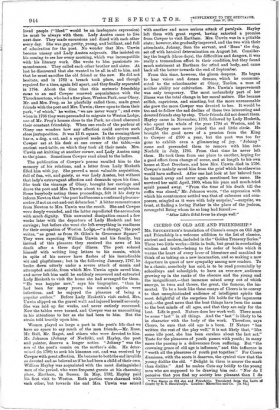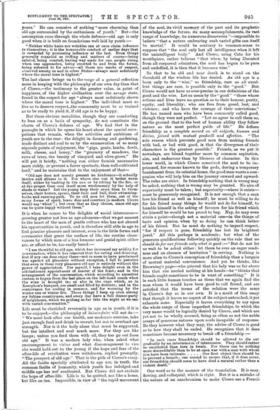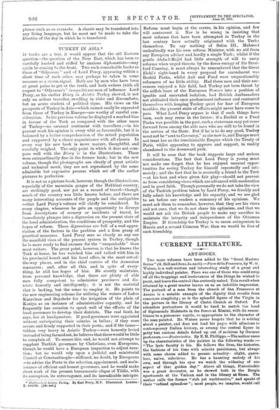CICERO ON OLD AGE AND FRIENDSHIP.* Mn. SRUCKBURGR'S translation of
Cicero's essays on Old Age and Friendship is a welcome addition to the list of classics, ancient and modern, included in the "Golden Treasury Series." These two little works—little in bulk, but great in everlasting wisdom and .truth—belong to the order of books which it warms the heart of every lover of literature and mankind to think of as taking on a new incarnation, and so making a new departure in quest of new sympathy among new readers. To be a classic, somebody has said, is to be read perennially by schoolboys and schoolgirls, to have an ever-new, audience growing up in the ranks of the obscure and the young and the insignificant,—that immense mixed army out of which emerge, in twos and threes, the great, the famous, the im- mortal. To be a book like these essays of Cicero is to convey to that unsophisticated audience of intelligent spirits the most delightful of the surprises life holds for the ingenuous soul,—the good news that the best things have been the same to the best minds of all ages, and that they are only for the best Life is good. Nature does her work well. There must be some "last" in all things. And the "last" is likely to be in character with the body of the work. Therefore, says Cicero, be sure that old age is a boon. If Nature "has written the rest of the play well," it is not likely that, "like some idle poet, she has been careless about the last act." Taste for the pleasures of youth passes with youth; in many eases the passing is a deliverance from suffering. But "the crowning grace of old age is influence," and this influence is "worth all the pleasures of youth put together." For Cicero dismisses, with the scorn it deserves, the cynical view that the young dislike the old. "Delight in them is nearer the mark than dislike." And he makes Cato say boldly to the young men who are supposed to be drawing him out: "Nor do I perceive that you find my society less pleasant than I do
0oo Essays on OM Age and .Friandship. Translated from the Latin of Cicero by E. S. Shnckburgh. London: Macmillan and Co. [2s. 61]
yours." He can conceive of nothing "more charming than old age surrounded by the enthusiasm of youth." But—the assumption runs through the whole defence—old age is only good when it is built on foundations well laid by youth :—
"Neither white hairs nor wrinkles can at once claim influence in themselves ; it is the honourable conduct of earlier days that is rewarded by possessing influence at the last. Even things generally regarded as trifling and matters of course—being saluted, being courted, having way made for one, people rising when one approaches, being escorted to and from the forum, being referred to for advice—all these are marks of respect, observed among us and in other States—always most sedulously where the moral tone is highest."
The last clause brings us to the verge of a general reflection more in keeping with the philosophy of our min day than that of Cicero,—the testimony to the greater value, in point of happiness, of the higher civilisation over the savage state, found in the respect for age "always most sedulously shown where the moral tone is highest." The individual must so live as to deserve respect„the community must be so trained as to be ready to yield it, if old age is to be happy.
But these obvious moralities, though they are comforting
to lean on as a basis of sympathy, do not constitute the charm of Cicero's defence of age. We find that in the
passages in which he opens his heart about the special occu- pations that remain, when the activities and ambitions of youth are in the rear: the delight in farming and gardening, made distinct and real to us by the enumeration of so many separate points of enjoyment, the ",pigs, goats, lambs, fowls, milk, cheese, and honey," the "greenery of meadows, the rows of trees, the beauty of vineyard and olive-grove." He will put it briefly, "nothing can either furnish necessaries
more richly, or present a fairer spectacle, than well-cultivated land," and he maintains that to the enjoyment of that— "Old age does not merely present no hindrance—it actually invites and allures to it. For where else can it better warm itself, either by basking in the sun or by sitting by the fire, or at the proper time cool itself more wholesomely by the help of shade or water?. Let the young keep their arms then to them- selves, their horses, spears, their foils and ball, their swimming. baths and running-path. To us old wen let them out of the tamy forms of sport, leave dice and counters [a modern Cicero would say ' whist 1; but even that as they choose, since old age can be quite happy without them."
It is when he comes to the delights of social intercourse— growing greater not less as age advances—that we get nearest to the heart of the man of gentle culture who has not abused
his opportunities in youth, and is therefore still able in age to find genuine pleasure and interest, even in the little forms and ceremonies that grace the surface of life, the routine obser- vances by which men of a less humane and genial spirit either are, or affect to be, too easily bored :—
"I am thankful to old age, which has increased my avidity for conversation, while it has removed that for eating and drinking. But if any one does enjoy these—not to seem to have proclaimed war against all pleasures without exception, I fail to perceive that even in these very pleasures old age is entirely without the power of appreciation. For myself, I take delight even in the old-fashioned appointment of master of the feast; and in the arrangement of the conversation which according to ancestral custom is begun from the last place on the left-hand couch when the wine is brought in; as also in the cups which, as in Xenophon's banquet, are small and filled by driblets; and in the contrivance for cooling in summer, and for warming by the winter sun or winter fire. These things I keep up even among my Sabine countrymen, and every day have a full dinner-party of neighbours, which we prolong as far into the night as we can with varied conversation.'
Life must be cherished reverently in age as in youth, if it is to be enjoyed,--the philosophy of laissez-faire will not do :—
We must look after our health, use moderate exercise, take just enough food and drink to recruit, but not to overload ctur strength. Nor is it the body alone that must be supported, but the intellect and soul much more. For they are like lamps; unless you feed them with oil, they too go out from old age." It was a modern lady who, when asked what
encouragement to virtue and what discouragement to vice she would hold out to the young if the hope and fear of the after-life of retribution were withdrawn, replied promptly, "The prospect of old age." That is the pith of Cicero's essay. All the faults specially attributed to age are, in truth, the
common faults of humanity, which youth has indulged and middle age has not eradicated. But Cicero did not exclude the hope of after-life: Life is to be quitted, not like a home, but like an inn. Impossible, in view of "the rapid movement
of the soul, its vivid memery of the past and its prophetic knowledge of the future, its many accomplishments, its vast range of knowledge, its numerous discoveries "—impossible. to believe "that a nature embracing such varied gifts can itself be mortal." It would be contrary to common-sense to suppose that "the soul only lost all intelligence when it left the unintelligent body." And Cicero, using Cato for his mouthpiece, rather believes "that when, by being liberated from all corporeal admixture, the soul has begun to be pure and undefiled, it is then that it becomes wise."
So that to be old and near death is to stand on the
threshold of the wisdom life has denied. As old age is a boon only to the "wise," so friendship, rare as all excel- lent things are rare, is possible only to the "good." But Cicero would not have us over-precise in our definitions of the good and the wise. Let us mean by the" good" "those whose actions and lives leave no question as to their honour, purity, equity, and liberality; who are free from greed, lust, and violence ; and who have the courage of their convictions?' He has named men who have been commonly called good, though they were not perfect. "Let us agree to call them so, on the ground that to the best of human ability they follow nature as the most perfect guide of life." He defines friendship as a complete accord on all subjects, human and divine, joined with mutual goodwill and affection. "The sole reason which prevents good men from making friends with bad, or bad with good, is that the divergence of their characters is the greatest possible." Friends, as we put it nowadays, are bOund together more by common aspiration, aim, and endeavour than by likeness of character. In this lower world, in which Cicero conceived the soul to be im- prisoned, for reasons known to the gods, during a temporary banishment from its celestial home, the good man wants a com- panion who will help him on the journey onward and upward. The rules are strict. In friendship nothing that is wrong may be asked, nothing that is wrong may be granted. No airs of superiority must be taken ; but superiority—where it exists— must be generously recognised. It is not enough that a man love his friend as well as himself; he must be willing to do for his friend many things he would not do for himself, to humble himself in the asking of favours for his friend which for himself he would be too proud to beg. Nay, he may even strain a point—though not a material one—in the things of taste and opinion, when by so doing he can think better of his friend. But he must do nothing to imperil respect, "for if respect is gone, friendship has lost its brightest jeweL" All this perhaps is academic; but what of the generous qualifications following quickly on the rule that we should do for our friends only what is good :—"But do not let us wait to be asked either: let there be ever an eager readi- ness and an absence of hesitation" in serving. Nothing is more alien to Cicero's conception of friendship than a bargain of mutual material convenience. And yet he thinks, like Browning's page—who grieved that his lady was so far above him that she needed nothing at his hands—he "thinks that friends ought sometimes to be in want of something." It is in such little human touches as these that we again find the man whom it would have been good to call friend, and are satisfied that the terms of the relation were the sane in Cicero's day as in our own. It is a merit of this essay that though it leaves no aspect of its subject untouched, it yet exhausts none. Especially it leaves everything to say upon the whole range of those imperfect friendships, to which the very name would be logically denied by Cicero, and which are yet not to be wholly scorned, being as often as not the noble assays of generous natures upon souls incapable of response. Be they however what they may, the advice of Cicero is good as to how they shall be ended. He recognises that it does sometimes become necessary to break off a friendship :— " In such cases friendships should be allowed to die out aradually by an intermission of intercourse. They should rather be unstitched than torn in twain. For there can be nothing more discreditable than to be at open war with a man with whom
you have been intimate
Our first object then should be to prevent a breach ; our second to secure that, if it does occur, our friendship should seem to have died a natural rather than a violent death."
One word as to the manner of the translation. It is easy, flowing, and colloquial, which is right. But it is a mistake of the nature of an anachronism to make Cicero use a French phrase such as en revanche. A classic may be translated into any living language, but he must not be made to take the liberties of the day in which he is translated.






















































 Previous page
Previous page